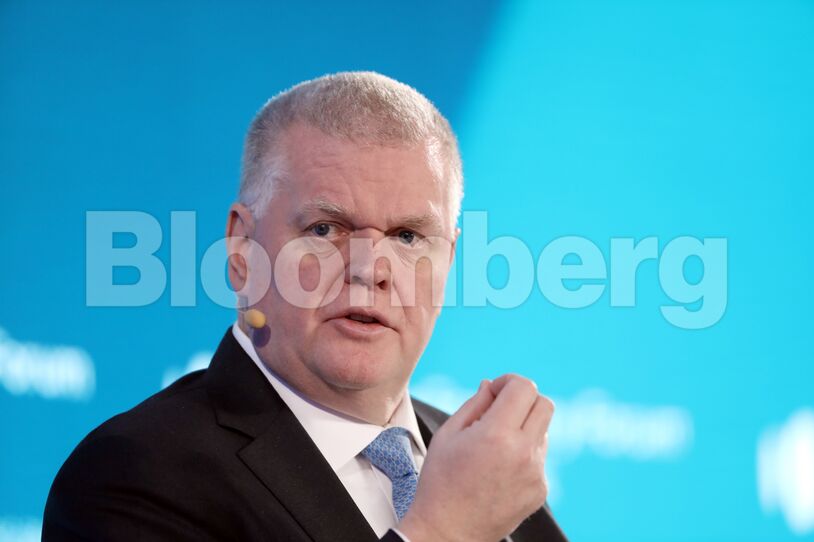The timing highlighted the growing tensions amid the coronavirus pandemic. The banks’ statements came on the eve of the anniversary of China’s 1989 Tiananmen Square crackdown and with the U.S. convulsed by violent protests. The Trump administration issued an order suspending passenger flights from China-based airlines and the U.K. government has offered refuge to as many as 3 million Hong Kong residents.
“They have to protect their business, which doesn’t make it right,” said Tom Kirchmaier, a visiting senior fellow at the London School of Economics. “The issue is that Britain is very weak on the global stage at the moment, and I doubt China will be concerned about any serious repercussions.”
While not being the first to back Beijing, HSBC and Standard Chartered are in a uniquely delicate position. Most of their earnings are generated in Asia but their headquarters are in London, where the British government has backed expressed opposition to a new security law in its former colony.
Major local businesses including Jardine Matheson and billionaire Li Ka-shing have come out in support of China’s proposals in recent weeks. Swire Pacific Ltd., the parent company of Hong Kong-based airline Cathay Pacific Airways Ltd., and Sun Hung Kai Properties Ltd., the city’s largest developer, are also among top companies that have voiced support for the law, while a poll has showed broad public opposition.
HSBC shares rose 1.8% as of 10:03 a.m. in Hong Kong. StanChart rose 2.3%.
HSBC’s Footprint
Hong Kong and China are vital to HSBC, which made profits of $12.1 billion in the Chinese city last year. Greater China accounted for 40% of the London-based company’s revenue. A strategy revamp in February sees an even greater focus on Asia, and in particular China. Getting on the wrong side of the Chinese government is not an option for new Chief Executive Officer Noel Quinn.

Alistair Carmichael, a British lawmaker and chairman of the U.K. parliamentary group on Hong Kong, said HSBC erred in bending to China’s will on the proposed security law, which the U.S. says imperils the city’s special trade status because it impinges on freedoms guaranteed when the territory was handed back by Britain in 1997.
“It is a colossal misjudgment because you cannot as a British company the size of HSBC be seen to be advocating for what is a fairly flagrant breach of international law in a rules-based system,” Carmichael said. “This is tactically clever, but strategically stupid. In the longer term, this is a serious error of judgment, as banks rely on a rules-based system.”
The U.K. government had no immediate comment.
HSBC Chairman Mark Tucker is well known in Chinese business and political circles, having lived and worked in Hong Kong for more than 25 years. As protests roiled Hong Kong last year, Tucker gave an interview to Chinese state television. He held to the bank’s official line of condemning violence, while supporting the one country, two systems credo.

While not as exposed to Hong Kong as HSBC, the territory is nevertheless Standard Chartered’s biggest market.
StanChart Profits
Of the $2.4 billion in underlying pretax profits made by the bank in Greater China and North Asia last year, 61% came from Hong Kong; a further 14% came from China. Standard Chartered is in the process of setting up a new virtual bank in Hong Kong as part of a plan to boost its retail operation in the city and appeal to a younger generation.
Standard Chartered’s statement was also lower key than its bigger rival’s.
HSBC’s top executive in Asia, Peter Wong, was photographed signing a petition in support of the proposed security legislation, according to a post on the bank’s official WeChat account. The lender supports rules that stabilize Hong Kong’s social order and revitalize the economy under the “one country, two systems” principle, the post read.
“We reiterate that we respect and support laws and regulations that will enable Hong Kong to recover and rebuild the economy,” it said. They marked HSBC’s first public comments on the topic after Hong Kong’s former chief executive, Leung Chun-ying, lambasted the global lender for not publicly voicing its support for China’s plan.
HSBC drew the ire of Hong Kong’s anti-government campaigners in the unrest last year, with its branches vandalized after it closed an account linked to the protests. While HSBC had cited inconsistent activity in the account that it closed down, its motives were questioned at a time when it’s pushing into China and repairing its relationship with Beijing, having cooperated in the U.S. probe of Huawei Technologies Co.
Hong Kong activists reacted with dismay to HSBC’s decision. Joshua Wong, one of the city’s most prominent activists, said in a Bloomberg Television interview Thursday that it “implies how Hong Kong’s business companies and economic freedoms are being threatened by Beijing.”
A survey by the American Chamber of Commerce in Hong Kong showed that that 60% of its members think that the new security law will harm their local business operations.





















 Become an Insider
Become an Insider